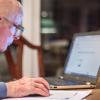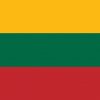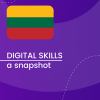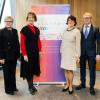All Digital Week - Lithuania
All Digital Week is one of the key EU-wide awareness-raising campaigns on digital skills that engages the citizens of 36 countries in Europe through various national activities taking place in participating countries. In Lithuania, the campaign over the last 3 years or so has been organised under the flag of the 'Connected Lithuania' project, an initiative whose goal is to raise the skills and competences of everyone in Lithuania. The All Digital Week usually takes place in the last week of March each year, with the aim of introducing people to ICT opportunities, their potential, and the importance of digital competence in all sectors.
Digital Week events take place in 36 countries in many locations: Digital Competence Centres, libraries, schools, community centres and others, bringing together a large team of partners since the start of the campaign in 2010. Each year, All Digital Week gets more than 100.000 participants together. In Lithuania, a big focus of All Digital Week is on good practices in digital skills in education that can be used and replicated by schools, institutions, libraries, teachers and educators, to support their individual activities.
Why do we need a digital week in Europe?
According to the Digital Economy and Society Indicators (DESI) report, the survey results on fake news and disinformation online, the survey results on the impact of digitalisation and automation on everyday life, digital skills may be the way forward, but Europe still has quite a bit to go. Close to half of EU citizens (43%) do not have sufficient digital skills - and therefore may miss out on growing employment opportunities. Another 35% of people in the EU lack even basic digital skills - and 13% of Europeans are still not using the Internet.
A growing number of EU citizens (29%) are sceptical in their ability to recognise disinformation. And concerns about automation also run high, with 72% of Europeans worried that a robot may replace their livelihood.
The Lithuanian experience: zooming on results
As a general rule, the topics of the Digital Week campaign revolve around several competence areas all linked to digital skills: media literacy, the development of critical thinking, digital literacy, safe online behaviors, and promoting digital skills for digital jobs.
In Lithuania, the Digital Weeks are organized under the framework of the national ‘Connected Lithuania’ project. So how did the campaigns take place over these 3 years and what was the engagement?
Digital skills resources for teachers and educators in Lithuania
The following materials may be of interest to teachers, schools, school administrators, VET teachers and trainers and educators in general. They can also help to organize an activity under the framework of the Digital Week in Lithuania. The resources listed below include good practices in increasing learners' digital skills as well in integrating digital technologies in teaching and learning. Materials include: video recordings from lessons, discussions, self-assessment tests, and materials adapted from previous educational activities.





